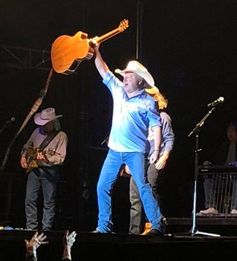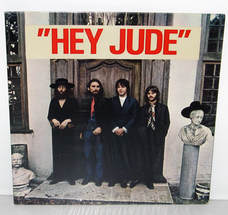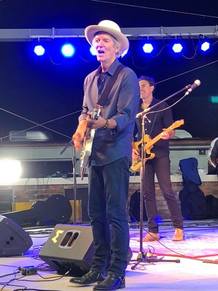 by Julian Spivey Mark Chesnutt, one of the most underrated voices in country music history, performed what amounted to a greatest hits show at the Arkansas State Fair in Little Rock, Ark. on Saturday, Oct. 20. Chesnutt began his set with “Goin’ Through the Big D,” a no. 2 hit for him in 1994, and right away you could tell the sound system at the Arkansas State Fair wasn’t at it’s best. The vocal was too low and drowned out quite a bit by the band. This would be something that would affect the performance, especially early on and during more raucous performances. Chesnutt continued his show with a couple of more hits “Blame It on Texas,” from 1991, and “I Just Wanted You to Know,” one of his nine no. 1 hits from the ‘90s. Chesnutt rode a wave of neotraditionalist country in the ‘90s becoming one of many big male vocalist stars along with artists like Garth Brooks, Alan Jackson, Clint Black, Travis Tritt, Tracy Lawrence, Joe Diffie and more and in my opinion is one of the truly underrated singers of his era. Chesnutt pays tribute to a lot of his country music heroes, some of whom like George Jones would become close friends of his. In fact, Chesnutt was given one of George Jones’ guitar straps, which he wore proudly during his show on Saturday evening. Chesnutt played a terrific cover of Jones’ “(I’m a) One Woman Man.” He also performed “Talking to Hank,” which he and Jones did a duet of for Chesnutt’s 1992 sophomore album Longnecks & Short Stories. Chesnutt would also perform nice covers of Charlie Rich’s “Rollin’ with the Flow” and Willie Nelson’s “What a Way to Live.” The great thing about legacy artists like Chesnutt is you’re going to get pretty much all of their greatest hits during their show and Chesnutt performed all but one of his No. 1 hits on Saturday night. That one he didn’t play was his final No. 1 from 1998, his cover of Aerosmith’s “I Don’t Want to Miss a Thing,” which he’s actually rather embarrassed now about cutting. Some of those other modern classics he performed during his set on Saturday were “Almost Goodbye,” which greatly showed off his fantastic vocals and the slower songs fixed the sound system issue a bit, and “Brother Jukebox.” Chesnutt has a good number of honky-tonkers in his repertoire, which had the Arkansas State Fair crowd tapping their feet and swinging along like “Old Flames Have New Names,” “It’s a Little Too Late,” “It Sure Is Monday” and “Gonna Get a Life,” with those final three ending his set before he came back for a one-song encore of the ultimate honky-tonker “Bubba Shot the Jukebox,” much to the appreciation of the crowd. My favorite performances of Chesnutt’s show on Saturday night, however, were the one-two punch of slow tearjerkers “Too Cold at Home,” the first single of his career that became a top five hit in 1990, and 1992’s “I’ll Think of Something,” which went to No. 1. These are two of the most beautifully written (“Too Cold at Home” by Bobby Harden and “I’ll Think of Something” by Bill Rice and Jerry Foster) and performed country heartbreakers of all-time and I really believe both may be among the 100 greatest country songs ever released. It’s at both kind of disappointing and kind of fitting that it takes going to your local state fair these days to see some classic sounding country music, but Chesnutt brought the goods on Saturday night for sure.
0 Comments
 by Julian Spivey Over the last month The Word’s Facebook page followers have been participating in a ‘Greatest ‘60s Songs’ tournament and recently “Hey Jude” by The Beatles won the tournament as the greatest song of the 1960s in a close matchup against “House of the Rising Sun” by The Animals in a true battle of the British Invasion bands. “Hey Jude” is one of those perfect sing-along songs that seemingly everybody knows all of the lyrics to and everybody likes to rock out to in the long (after many listens maybe too long) coda with all the “na na na nas.” If you’ve ever been in a packed arena with McCartney singing it and the crowd screaming along, as I’ve had the great experience of doing, it’s truly one of those magical musical moments. I think most well-informed music lovers even know the story behind the song, at least partially, in that it was written by Paul McCartney for John Lennon’s oldest son, Julian, during a hard time in young Julian’s life when John was separating with his first wife Cynthia after an affair with future wife Yoko Ono. For a family-friend and bandmate of his father it showed an awful lot of caring on McCartney’s part to compose such a song, that would become The Beatles high-selling single and eventually an all-time classic known worldwide. One month after John and Cynthia separated, Paul drove to meet Cynthia and Julian with the purpose of delivering them one single rose. McCartney would later tell writer Barry Myles that he found it “a bit much for them [Cynthia and Julian] suddenly to be personae non gratae and out of my life,” after all Cynthia had been a part of The Beatles social circle since before they hit it big. During this car ride to visit Cynthia and Julian, McCartney was thinking about 5-year old Julian and his uncertain future and the struggle of divorce on a young child and began singing the words “Hey Julian” with other lyrics about comforting and reassuring him improvised throughout. It wouldn’t take long for “Hey Julian” to turn into the less syllabic “Hey Jules” and “Hey Jules, don’t make it bad, take a sad song and make it better” – which would become the opening line to “Hey Jude” flowed out. The song title would be changed during the fleshing out of the lyrics because Paul thought it to be a stronger name. According to Steve Turner’s The Beatles: A Hard Day’s Write, the song – though written for Julian – would be confused by John as being about him and encouraging him to make a break from his family and start a new future with Yoko. McCartney would also end up feeling the song as much about himself and the ending of old bonds within the band as reassuring himself that everything would be OK. Julian has known for most of his life that “Hey Jude” was written about and for him and admitted that at an early age he had a closer relationship to McCartney than his own father. “We had a great friendship going and there seem to be far more pictures of me and Paul playing together at that age than pictures of me and dad,” Julian said. He also said how much the song continues to mean to him. “It surprises me whenever I hear it. It’s very strange to think that someone has written a song about you. It still touches me.” [Turner, 239] “Hey Jude” was released as a single in August of 1968 and it would become the group’s longest serving No. 1 hit in the United States, topping the charts for nine weeks. In 2013, Billboard called it the “10th biggest song of all-time.” In 2001, the National Academy of Recording Arts and Sciences inducted it into the Grammy Hall of Fame. “Hey Jude” was ranked as the eighth greatest song of all-time by Rolling Stone in its 2004 list of the “500 Greatest Songs of All-Time,” making it the highest ranking Beatles song on that list. Uniquely enough The Word’s Facebook page previously held a greatest Beatles song tournament and “Hey Jude” was not the winner, but rather 1967’s “A Day in the Life,” which lost in the Final Four of the “Greatest ‘60s Songs Tournament” to “House of the Rising Sun” by The Animals.  by Julian Spivey Grammy-winning singer-songwriter Rodney Crowell brought his fantastic Americana/country sound to the 21st annual Depot Days Festival in downtown Newport, Ark. on Saturday, Sept. 29. The fantastic country music songwriter who’s one of the leading figures in the Americana genre and community performed quite the surprising rockabilly show at Newport, on the famed Rock ‘N’ Roll Highway 67 in northeastern Arkansas named for the rockabilly shows that took place in the night clubs of the area back in the day combining rock ‘n’ roll, blues and country music. Crowell began his performance with his 1983 song “Stars on the Water,” which is one of my favorites in his repertoire and one that’s notably been covered by both Jimmy Buffett and George Strait. The rockabilly flavor of the show was off and running almost right away with “Telephone Road,” the opening track from his critically-acclaimed 2001 release The Houston Kid. That sound would pop back up bigtime toward the end of Crowell’s set, but one of the early highlights was his cover of Waylon Jennings’ “Waymore’s Blues,” an outlaw country classic with a bit of R&B flavor thrown in. Crowell was able to mix his rocking performance with his sometimes wordy songwriting on “Dancin’ Circles ‘Round the Sun (Epictetus Speaks).” It was very early on in the evening when I realized just how talented of guitarists Crowell had performing with him in two young Aussies Joe Robinson and Jedd Hughes, who just lit the stage ablaze with their fantastic guitar playing. Crowell, who was at one point Johnny Cash’s son-in-law (when married to Rosanne Cash) and remained a close friend until Johnny’s death, wasn’t going to come to the area (just over an hour west of Cash’s hometown) without covering his dear friend. I’m thrilled that Crowell chose the heartbreaking “I Still Miss Someone” as his choice as it’s one of Cash’s most underrated classics and one of my favorites from the Arkansas legend. It would be one of the few slower songs Crowell would play during the evening. The cover of “I Still Miss Someone” would lead into one of my favorite sections of Crowell’s Depot Days set with the rocking “Frankie Please” and “She’s Crazy for Leaving,” one of his five straight No. 1 singles off his 1988 album Diamonds & Dirt, which was a record for most No. 1 singles off one country album. Crowell would slow things down once again with “After All This Time,” another one of those five No. 1 hits off his 1988 release. It would be the last slow song of his main set as he, Hughes and Robinson would embark on a rockabilly riot from that point out that really got us toward the front of the crowd grooving. To start this segment of his show off Crowell broke out “Old Pipeliner,” from his 1981 self-titled album. The song was originally released by Red Sovine in 1967. Crowell’s jam session on the song would last seven minutes. Crowell and band would then rip through a cover of the much covered “Tobacco Road,” originally released in 1960 by John D. Loudermilk. The one-two-three punch with which Crowell would end his set was outrageously good with a cover of the Jerry Lee Lewis classic “Whole Lotta Shakin’ Goin’ On,” his own country-rock jam “I Ain’t Living Long Like This” (which was ultimately my favorite performance from his excellent set) and the incredibly surprising and thrilling cover of Bob Dylan’s “Like a Rolling Stone,” which Rolling Stone magazine called the greatest song of all-time. Crowell received uproarious applause from the Depot Days crowd and played a one-song encore consisting of “Song for the Life,” from his 1978 debut album Ain’t Living Long Like This. It was almost a shock to the system with Crowell going slow for his encore after such a rocking finish to his show, but it was a truly touching performance that left the crowd awestruck right before packing up to head home. I’d always wanted to see Crowell in concert, as he’s one of my favorite songwriters, and he certainly did not disappoint in Newport on Saturday night. |
Archives
July 2024
|